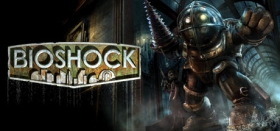
BioShock Infinite: False Prophets
"Booker, are you afraid of God?" These words whisper through a black screen as a picture slowly bleeds onto your display. This is the first thing you will hear when you boot up BioShock Infinite. The city of Columbia is pregnant with the seed of religious zealotry, bubbling at the edges of a society whose citizens are blinded by the promises of a prophet who has seen their future.
This is very similar to a certain religion that exists in our own universe. I won't mention which, for fear of offending, but regardless of that specific religion, it draws parallels with nearly all of them. At their most basic they are all reskinned versions of the same events, after all - often changed as time passes to suit the policies of those in power.

In the original Bioshock, the lighthouse was an obelisk, highlighted by a semi-visible full moon and framed by a swirl of angry clouds. Upon entering, the doors close behind you, forcing you to enter the bathysphere and descend to the depths below. Dark coloured, jagged edges.
In Bioshock Infinite, the lighthouse is a cylinder, only visible against the dark sky because of its light colour and spinning beacon highlighting its summit.
Once inside, you're greeted by a bowl of water and some towels and a framed quote gives you reassurance with its promise, "Of thy sins shall I wash thee". This isn't a question, it's a statement: the speaker WILL wash you of your sins.

You can ignore the bowl and walk up the stairs if you wish, but something pulls you towards the bowl, regardless, and Booker stares into his own reflection, contemplating the extent of his trespasses - presumably deciding that his actions will need more than water to wash off.
The elevator that eventually takes you into the skies refers to Booker as a "pilgrim" suggesting that the journey in front of him is a spiritual one, and throughout the whole game religious imagery is used in a specific way, one that draws many parallels to real world religions.
One lighthouse takes you down, and the other takes you up into the clouds above. Heaven and hell, with the real world existing between the two, as a purgatory, of sorts.
During development of the game it was stated that one of the team had written their notice because they were offended by an event that happens within the narrative of the game - one that either conflicted with their beliefs, or one that touched a personal nerve, at least.
I believe I know what this was. I was fortunate enough to try the game during its preview state, and there were a few omissions - some probably legal, like the barbershop quartet's name, "the B Sharps", being removed. Others were most likely because they existed as only needless filler, like the countless other collectables that were dotted around, missing from the final game.
Yet there was one change that stood out.
During the opening hours of the game, before Booker meets Elizabeth, there is a section where he finds himself in a blimp. There's a nun stood in the corner, and our protagonist reassures her that he's not going to hurt her. Well, in the preview the nun wasn't female. In fact, she wasn't even an adult. The nun was a small, male child.

This little boy then proceeds to self immolate in front of the player, setting fire to himself and setting the blimp alight in the process, in an attempt at killing Booker. It was shocking to say the least, and even for an atheist, like myself, it was a little close to the line - drawing parallels with child soldiers in other countries who are so indoctrinated by faith that they're willing to end their lives for the 'greater good'.
As I left the preview, I remember myself saying to the public relations staff, something along the lines of, "I'm surprised that bit made it into the game". Yet, in the end, it didn't. And although a part of me wishes that artistic integrity had been preserved, I can't help but feel that they made the right choice.
Narratively speaking, it made much more sense with the nun. Firstly, you don't see any children in the church at the beginning of the game. And secondly, it's not like you come across masses of child soldiers throughout the narrative.
It would have felt like shock for shock's sake to the masses, and I feel they may have taken it that one step too far. I've heard stories of some sites boycotting the game entirely based on religious grounds, and it would have been a shame for them to limit their audience. If there's a sure-fire way to provoke a negative response, it's by making some sort of comment on religion, and for that, Ken Levine and team deserve heaps of praise for even daring to tackle it, however subtly.










COMMENTS
Platinum - 03:04pm, 18th July 2016
ohhhh